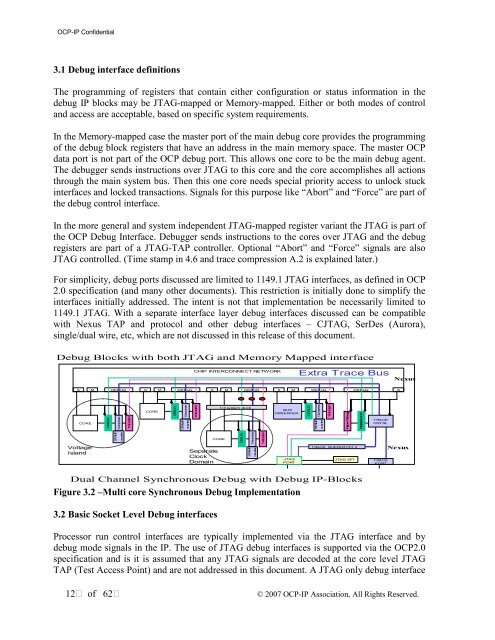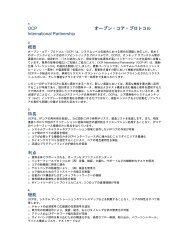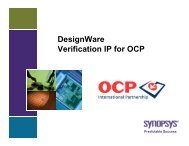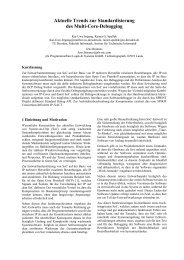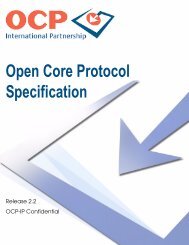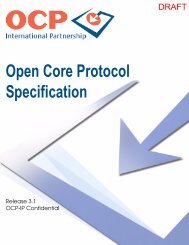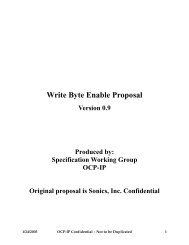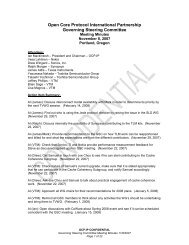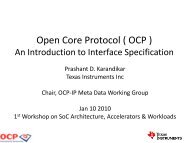Open Core Protocol Debug Interface Specification rev 1.0 - OCP-IP
Open Core Protocol Debug Interface Specification rev 1.0 - OCP-IP
Open Core Protocol Debug Interface Specification rev 1.0 - OCP-IP
You also want an ePaper? Increase the reach of your titles
YUMPU automatically turns print PDFs into web optimized ePapers that Google loves.
<strong>OCP</strong>-<strong>IP</strong> Confidential<br />
3.1 <strong>Debug</strong> interface definitions<br />
The programming of registers that contain either configuration or status information in the<br />
debug <strong>IP</strong> blocks may be JTAG-mapped or Memory-mapped. Either or both modes of control<br />
and access are acceptable, based on specific system requirements.<br />
In the Memory-mapped case the master port of the main debug core provides the programming<br />
of the debug block registers that have an address in the main memory space. The master <strong>OCP</strong><br />
data port is not part of the <strong>OCP</strong> debug port. This allows one core to be the main debug agent.<br />
The debugger sends instructions over JTAG to this core and the core accomplishes all actions<br />
through the main system bus. Then this one core needs special priority access to unlock stuck<br />
interfaces and locked transactions. Signals for this purpose like “Abort” and “Force” are part of<br />
the debug control interface.<br />
In the more general and system independent JTAG-mapped register variant the JTAG is part of<br />
the <strong>OCP</strong> <strong>Debug</strong> <strong>Interface</strong>. <strong>Debug</strong>ger sends instructions to the cores over JTAG and the debug<br />
registers are part of a JTAG-TAP controller. Optional “Abort” and “Force” signals are also<br />
JTAG controlled. (Time stamp in 4.6 and trace compression A.2 is explained later.)<br />
For simplicity, debug ports discussed are limited to 1149.1 JTAG interfaces, as defined in <strong>OCP</strong><br />
2.0 specification (and many other documents). This restriction is initially done to simplify the<br />
interfaces initially addressed. The intent is not that implementation be necessarily limited to<br />
1149.1 JTAG. With a separate interface layer debug interfaces discussed can be compatible<br />
with Nexus TAP and protocol and other debug interfaces – CJTAG, SerDes (Aurora),<br />
single/dual wire, etc, which are not discussed in this release of this document.<br />
<strong>Debug</strong> Blocks with both JTAG and Memory Mapped interface<br />
CH<strong>IP</strong> INTERCONNECT NETWORK<br />
Extra Trace Bus<br />
Nexus<br />
S<br />
M DEBUG S M DEBUG S M DEBUG S M DEBUG<br />
DEBUG<br />
S<br />
CORE<br />
DEBUG<br />
Compress<br />
TRIGGER<br />
CORE<br />
DEBUG<br />
STAMP<br />
Compress<br />
counter<br />
TRIGGER<br />
1/3 system clock<br />
BUS<br />
OBSERVER<br />
DEBUG<br />
STAMP<br />
Compress<br />
counter<br />
TRIGGER<br />
Hyper <strong>Debug</strong><br />
DEBUGCntrl<br />
TRACE<br />
CNTRL<br />
Voltage<br />
Island<br />
STAMP<br />
counter<br />
Separate<br />
Clock<br />
Domain<br />
CORE<br />
DEBUG<br />
STAMP<br />
Compress<br />
counter<br />
TRIGGER<br />
JTAG<br />
PORT<br />
TRACE BUFFER Ch1,2<br />
JTAG DFT<br />
TRACE<br />
PORT<br />
Nexus<br />
Dual Channel Synchronous <strong>Debug</strong> with <strong>Debug</strong> <strong>IP</strong>-Blocks<br />
Figure 3.2 –Multi core Synchronous <strong>Debug</strong> Implementation<br />
3.2 Basic Socket Level <strong>Debug</strong> interfaces<br />
Processor run control interfaces are typically implemented via the JTAG interface and by<br />
debug mode signals in the <strong>IP</strong>. The use of JTAG debug interfaces is supported via the <strong>OCP</strong>2.0<br />
specification and is it is assumed that any JTAG signals are decoded at the core level JTAG<br />
TAP (Test Access Point) and are not addressed in this document. A JTAG only debug interface<br />
12 of 62<br />
© 2007 <strong>OCP</strong>-<strong>IP</strong> Association, All Rights Reserved.


